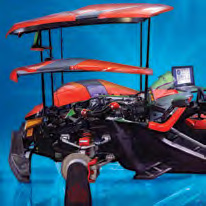May 1, 2019 Washtenaw Community College
Washtenaw Community College is preparing students for the future of smart vehicle technology
Washtenaw Community College recently introduced its latest recruiting tool — a sassy, red Polaris Slingshot equipped with smart car technology and modified in the College’s advanced manufacturing labs by a team of automotive service and motorcycle program faculty, staff and students. Each modification represents a different skill or technology being taught on campus.

“Everything done to this vehicle was something that our students can learn in a class today, and it was done on equipment that is being used in the workplace today,” said Al Lecz, director of WCC’s Advanced Transportation Center. “This kind of hands-on experience is what gives our students a competitive advantage when they’re seeking employment.”
Sections of WCC’s vehicle are customized with lightweight carbon fiber materials and 3D printed parts. It is also equipped with front and side LiDAR — a remote sensing method that uses light in the form of a pulsed laser to detect and measure distance to objects. Other equipment includes a dedicated short-range communications (DSRC) system capable of sending and receiving basic safety messages between vehicles, traffic infrastructure and pedestrians. The newly modified vehicle was first shown at the North American International Auto Show in Detroit in January.
This Polaris Slingshot was customized by WCC faculty, staff and students. Modifications highlight different skills and technologies taught on campus.
SMART/CONNECTED VEHICLE
Dedicated short-range communication (DSRC) Front and rear LiDAR with targets displayed on mounted tablets 1 Object detection system,
360-degree bird’s-eye-view camera 2
3D-PRINTED PARTS
The following parts were designed using programs taught in WCC’s Mechatronics and Numerical Control Tool classes and printed in the College’s 3D Printing labs:
- Wheels
- Front & rear LiDAR mounts
- Wheel stand
- Front & rear tablet mounts
- Bridge brackets 3
LIGHTWEIGHT/CARBON FIBER PARTS
Made of composite materials developed, molded and pressurized in the College’s autoclave; the same process learned by Auto Body Repair students.
- Front wings 4
- Rear roll bar humps
- Top engine cover
- Belt guard
DATA COLLECTION
Built-in data collection points running on-board diagnostics to a laptop in the vehicle 5 and a strain gauge data logger 6 ; technology used by Automotive Test Technician and Motorcycle Service Technology students.
PLASMA CUTTER
Wheel stands 7 and the College’s name across the LED-lighted bridge 8 were made with a plasma cutter used in the College’s welding program.
POWDER COATING
Multiple parts were powder coated, a process taught in the Motorcycle Service Technology program.
- LED-lighted bridge 8
- Rear shock mount
- Air intake tubing
- Front & rear springs
- Support/display structure
To learn more, check out our programs in:
ENGINEERING TECHNOLOGIST
MANUFACTURING
MECHATRONICS
WELDING TECHNOLOGY
AUTOMOTIVE SERVICE
TECHNOLOGY
AUTOMOTIVE TEST TECHNICIAN
POWERTRAIN DEVELOPMENT
TECHNICIAN